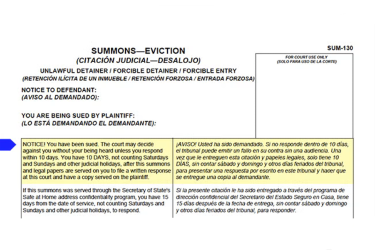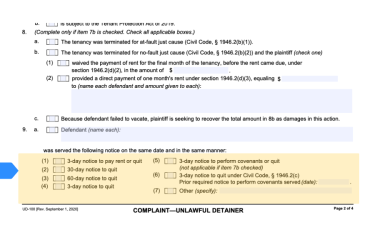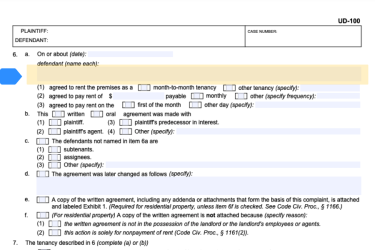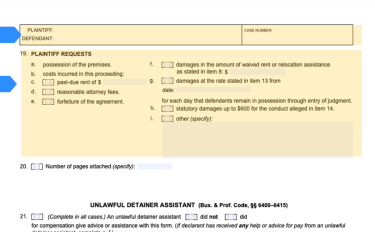What do these papers mean?
Summons-Unlawful Detainer-Eviction (form SUM-130)
🔗 All court form links open in a new tab.
If you get a Summons (form SUM-130), this means your landlord started a court case asking a judge to order you to move out - to evict you. The Summons comes with another paper called a Complaint and a form, Plaintiff's Mandatory Cover Sheet and Supplemental Allegations (form UD-101). An eviction court case is also called an unlawful detainer case.
Jump to section:
What does this mean for you?
- Respond to the eviction case by filing a written response with the court very quickly. This means you're going to participate in the lawsuit and fight the eviction.
- Talk with your landlord and try to come up with an agreement where you can stay in your home. You may be able to work with a mediator who helps people come to an agreement outside of court.
- Move out. But know that if you owe back rent your landlord can still sue you for it in small claims or a civil court case.
- Do nothing. The landlord can evict you without your having a say in the case. This can hurt your ability to rent in the future. If you owe money for back rent, the landlord may be able to take that money from your paycheck or bank account.
⚠️ Even if you choose to talk with your landlord or move out immediately, it is a good idea to file an Answer or other forms so the case isn't decided without your having a say.

How much time do you have?
You must act quickly. You have 10 days to file an Answer form or other legal forms after you’re handed (served) the Summons and Complaint forms.
Don't count Saturdays, Sundays, or court holidays. Day 1 is the day after the Summons and Complaint were handed to you.
If someone handed the forms to you (even if you didn't take them and they were just left on the ground near you), you have 10 days to file an Answer.
You have more time to file an Answer if:
- The forms were given to someone at your home or work instead of you and then a copy was mailed to you (this is called substituted service)
- A copy was posted at your home and a copy was mailed to you (this is called service by posting)
If you were served by substituted service or service by posting:
You have 20 days after the server mailed the Summons and Complaint to you to file an Answer.
- The mailing date is the postmark date.
- Day 1 is the day after the server mailed the Summons and Complaint to you.
- For the first 10 of the 20 days, count regular calendar days (every day, including weekends and holidays). The 10th day is the day you're considered served.
- Then you count 10 court days. For these 10 court days, do not count Saturdays, Sundays, or court holidays. The 10th day is the deadline to respond to the Complaint.
If you were served through the Secretary of State's Safe at Home address confidentiality program:
You have 15 days, not counting Saturdays, Sundays, or court holidays, to file an Answer.
Talk to a Self-Help Center or lawyer if you have questions about the deadlines or how you were served.
If you don't file an Answer or other forms by the deadline your landlord can file papers to ask the judge to order that you're evicted from your home without your input. After that, your landlord will have the sheriff give you a Notice to Vacate, which gives you 5 days to move out.

Why are you being evicted?
You should have already received a written Notice from your landlord that tells you why they want to evict you and how long you have to move out.
The reason they are evicting you and the type of Notice you received should also be explained in the Complaint. You'll either get a form titled Complaint – Unlawful Detainer (form UD-100) or a complaint typed up in a specific legal format where each line is numbered (called pleading paper).

Who is being evicted?
You and any other tenants who are being evicted will be named in the Complaint as the defendant(s).

Is your landlord asking for money?
The Complaint lists what the plaintiff (your landlord) wants the judge to order you to do. You will see possession of the premises listed on the form or mentioned (if on pleading paper). This means they want you to move out. The Complaint may also describe damages, costs, or fees if they want you to pay money.
Key takeaways
- The court papers mean your landlord filed an eviction case.
- You may have 10, 15, or 20 days to respond, depending on how you were served.
- You can file an Answer, move out, negotiate, or do nothing.
- Filing an Answer gives you more options.
- If you don’t respond, you could be evicted and owe money.
- There is free legal help available.
Explore your options for what to do next
-
The judge will decide the case without your input and your landlord will probably be able to evict you.
-
Respond and defend yourself in court
If you think you have a legal reason you shouldn't be evicted, or if you just want the court to hear your side of the story, you can respond by filing an Answer form with the court.
-
Move out or try to negotiate with your landlord
You may be able to come to an agreement with your landlord. Even if you choose to negotiate, it's still a good idea to file an Answer with the court to protect your rights.
-
Get help
You may be able to get help from your court's Self-Help Center, Legal Aid, a local law library, or housing agency.

